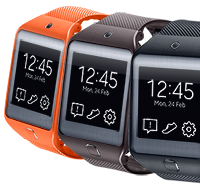Mobile Technology Companies Switching Platforms

Samsung recently announced the release of its Tizen-based smart watches, which means it ditched Android. About the same time, there was news that Nokia embraced Android when announcing its Nokia X series of phones. What's happening in the mobile technology space that is causing established vendors to switch their underlying platforms?
Tizen is a Linux-based operating system for devices—including smartphones, tablets, in-vehicle infotainment devices, smart TVs, and smart cameras. Samsung's adopting Tizen should be analyzed from a business and a technical perspective.
The business perspective is easy to understand when you consider how Samsung has benefitted from Android and vice-versa. According to a Localytics analysis, 63 percent of all Android devices are made by Samsung.
Apart from deploying Android as a platform for its devices, Samsung also offers its users music, messaging, and other Samsung services. With Android and its apps, Samsung hasn’t been very successful at locking its services with its existing users. In the words of a researcher with Korea's Information Society Development Institute, “With only hardware, its influence is limited. Samsung’s goal is to establish an ecosystem centered on Samsung.”
Google, though it offers Android for free, gains by its mass adoption, which is mostly due to Samsung. It allows Google to be at the forefront of mobile Internet traffic via its search engine and helps them earn huge revenue via advertising.
The technical reasons for Samsung's adoption of Tizen are reflected in the words of Samsung's director of product planning, "...that the new Gears can get up to an extra two days of battery life by running Tizen, even though they have the same size battery. The original Android-powered Galaxy Gear barely made it through a day on one charge," confirming that Android in its current form isn’t optimized for wearable devices.
In the case of Microsoft's embracing Android (via Nokia), it is said to help Nokia gain an even wider presence in developing markets. The Nokia X line is described as low-cost but good looking phones.
With the Windows phone OS not being as popular with the masses as Android, these Nokia devices give Microsoft a chance to ride on Android's popularity by bundling Microsoft services—Bing, Outlook, etc.—with these devices. Like other vendors, Nokia has legally modified the version of Android to suit its needs.
Both of these cases reflect the importance of a solid platform strategy as the foundation of any technology product. Even though Microsoft and Samsung seem to be treading different paths than in the past, their current and past strategies reflect forward platform thinking, irrespective of who's behind creating those platforms.
As a Harvard Business Review article says, "Every business today is faced with the fundamental question that underlies Platform Thinking: How do I enable others to create value? Building a better mousetrap still might not have the world beat a path to your door. But the right platform might just do the trick."
Do you agree?

